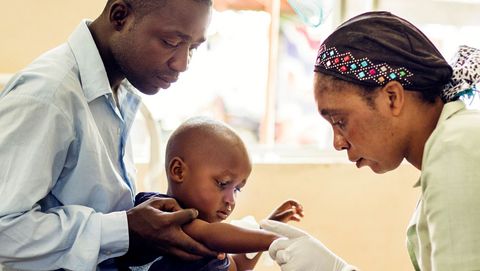Malaria Vaccines
Recently, the malaria burden was successfully reduced as a result of scaling up preventive and treatment measures. Nevertheless, new tools, such as vaccines, are urgently needed. This is especially true given parasites are developing resistance to existing malaria drugs, and mosquitoes are developing resistance to insecticides.
Malaria vaccines are potential new tools in combating malaria by targeting several different stages of the parasite lifecycle to prevent infection and clinical disease, or to block malaria transmission.
Swiss TPH Contributes to all Levels of Vaccine Development
Swiss TPH has a significant role in the research and development of new malaria vaccines, contributing across the whole development pathway: from discovery to preclinical studies, and through to human clinical testing in both early and late studies with many African collaborators. This includes studies at the Clinical Trial Research Unit in Bagamoyo arm of the Ifakara Health Institute.
Several Swiss TPH malaria vaccine experts are members of review committees assessing malaria vaccines, and additionally, research groups at Swiss TPH have provided evidence, such as cost-effectiveness analysis, to decision making boards.
Project Highlights
Promising Malaria Vaccine Candidate Boosts Immunity in Endemic Regions
A new malaria vaccine candidate, SUM-101, has shown to be safe and to trigger strong immune responses in adults living in a malaria-endemic area of Tanzania. Conducted by the Ifakara Health Institute (IHI), Swiss TPH, and Sumaya Biotech, this Phase Ib clinical trial marks an important step toward next-generation malaria vaccines. The study found that SUM-101, based on the full-length merozoite surface protein 1 (MSP1), was well tolerated and induced robust, lasting antibody responses that recognised multiple Plasmodium falciparum strains. The results suggest that the vaccine can effectively boost existing immunity in malaria-exposed populations — a key consideration for future vaccine design. Building on these encouraging findings, two follow-up trials are underway in Tanzania and Burkina Faso to test SUM-101 in children and under controlled infection conditions. Read more
The RTS,S Vaccine
Currently, more than 20 malaria vaccines candidates are being evaluated at various institutes world-wide, with one vaccine having completed Phase 3 Clinical studies, the malaria vaccine RTS,S/AS01, also known as Mosquirix. RTS,S received a positive scientific opinion from the European Medicines Agency and in early 2016 the World Health Organization recommended further implementation studies in Africa to assess its impact on mortality and the ability of immunization programmes to achieve four doses in children. Swiss TPH was integrally involved with partners in the Phase 3 and earlier clinical studies of RTS,S.
In addition, Swiss TPH led a multi-institute study, that predicted the public health impact and cost-effectiveness of the vaccine in sub-Saharan Africa when used in addition to high coverage of vector control. The researchers found that over a 15 year time horizon in moderate to high transmission settings, an average of 116,500 cases of clinical malaria disease and 484 deaths would be averted for every 100,000 children vaccinated under a four-dose schedule [more]. This work further contributed scientific evidence considered by the World Health Organization and Gavi, the vaccine alliance, in their decision making on use and funding.

